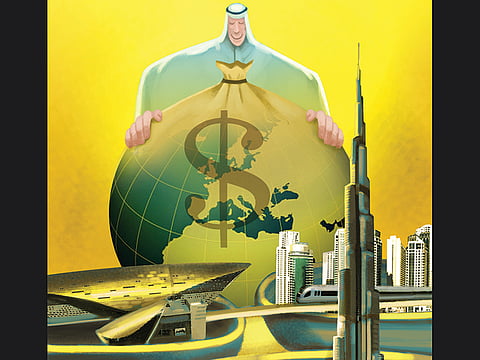A global asset exposure makes for a sound decision
Home bias in investment allocation can quickly add up to missed opportunities

In a period of market turbulence, fears of a global economic slowdown and a decline in oil prices, UAE investors must turn to alternative investment strategies to dampen volatility from the GCC capital markets.
The wealth management industry in the region is evolving and this changing environment has required the industry to become more dynamic and responsive, to boost demand from underlying long-term growth opportunities overseas. Traditionally, investors are more comfortable in domestic-focused equities, maintaining familiarity with their national markets and understanding local regulatory frameworks, with the perception that this approach provides less risk.
Although navigating today’s volatile and uncertain global investment landscape is challenging, investors could achieve greater returns and risk management benefits by adopting a globally diversified investment strategy over the long-term.
Diversification is one of the most fundamental investment principles. The UAE economy has maintained steady growth as it has focused on diversifying its economic policies and increasing the contribution of the non-oil sector. As global oil prices continue to slump, Middle East investors’ dependent on oil, gas and commodity stocks are turning to different opportunities to buy assets which can provide sustainable yields.
For example, large sovereign wealth funds in the region have allocated substantial investments in prime real estate markets with focus on the US and European geographies. Investors are also becoming more dynamic, there is a new generation of HNWIs (high networth individuals) and UHNWIs looking for new and differentiated products and services, actively pursuing global solutions to increase their incomes as global equity and bond markets remain volatile.
Global diversification
However, the key factor is to have the right portfolio, which is internationally diversified and well-adjusted across asset classes, balancing income with risk appetite, returns, investing horizon and time frame and liquidity needs.
The greatest risk is not being diversified and a home-country bias can detract from opportunities in faster growing economies where valuations are more attractive. Global diversification adapts to economic changes, reacting to shifts dependent on where countries are in their economic cycle.
It enables investors to spread their risk across portfolios when specific markets and sectors face headwinds and not relying on one market to provide returns. International diversification also gives access to opportunities in sectors and industries that are not available locally.
In addition to diversifying globally, volatility exposure and control is just as important, by maintaining your investment portfolio with an appropriate balance of risk across a good spread of asset classes. Holding a diversified portfolio of international assets — including traditional bonds and equities as well as cash, commodities, property and private equity — can protect investors against the impact of a decline of a single asset class.
There is also the advantage of choosing a wide spread of investments, which are unlikely to move in the same direction of an economic cycle, thus creating a consistent performance under fluctuating economic conditions.
GDP movements
Global capital markets are now more accessible with an increased sophistication of financial products and opportunities on offer. Multi-fund managers can provide dedicated advice on specialist funds or trusts which offer multi-asset income strategies and offer guidance on broader macroeconomic trends, advice where regions or sectors are undervalued, GDP movements and central bank monetary policies.
These specialist funds invest in a range of different assets, holding equities, bonds, securities, cash, debt, REITs (real estate investment trusts) etc, which are designed to match an investor’s risk profile. An example for retail investors is an Exchange Traded Fund (ETF), which can fully track a diversified global index, holding multiple underlying assets and trades on a stock exchange.
Investing globally does also encounter risk. When you have chosen your spread of asset classes, investors will need to consider currency valuation and exchange rates as an associated risk, as currency volatility may affect your investment choice if financing directly in a foreign market. Current geopolitical concerns and regional conflicts may also impact higher growth leaving investors facing difficult and critical decisions as how to build and sustain their financial portfolios and generate steady yields.
Sophisticated customers
In an evermore globally connected world with market landscapes and economies intertwined, the wealth management industry has evolved to meet the requirements of more sophisticated customers looking to diversify their investment portfolios. Adapting to the changing environment has been an essential part of FGB’s wealth management strategy and today we are responding to our clients’ needs by creating a spectrum of customised wealth management products to offer a holistic approach to help investors optimise concerns on investment risk, return and liquidity.
Overlooking global diversification is the greatest risk in today’s uncertain economic environment. Maintaining a multi-asset investment portfolio with international exposure is vital for investors to achieve additional growth income, decrease risk and generate attractive returns over the long-term.
The writer is the Global Head of Wealth Management and Mortgages at FGB.



